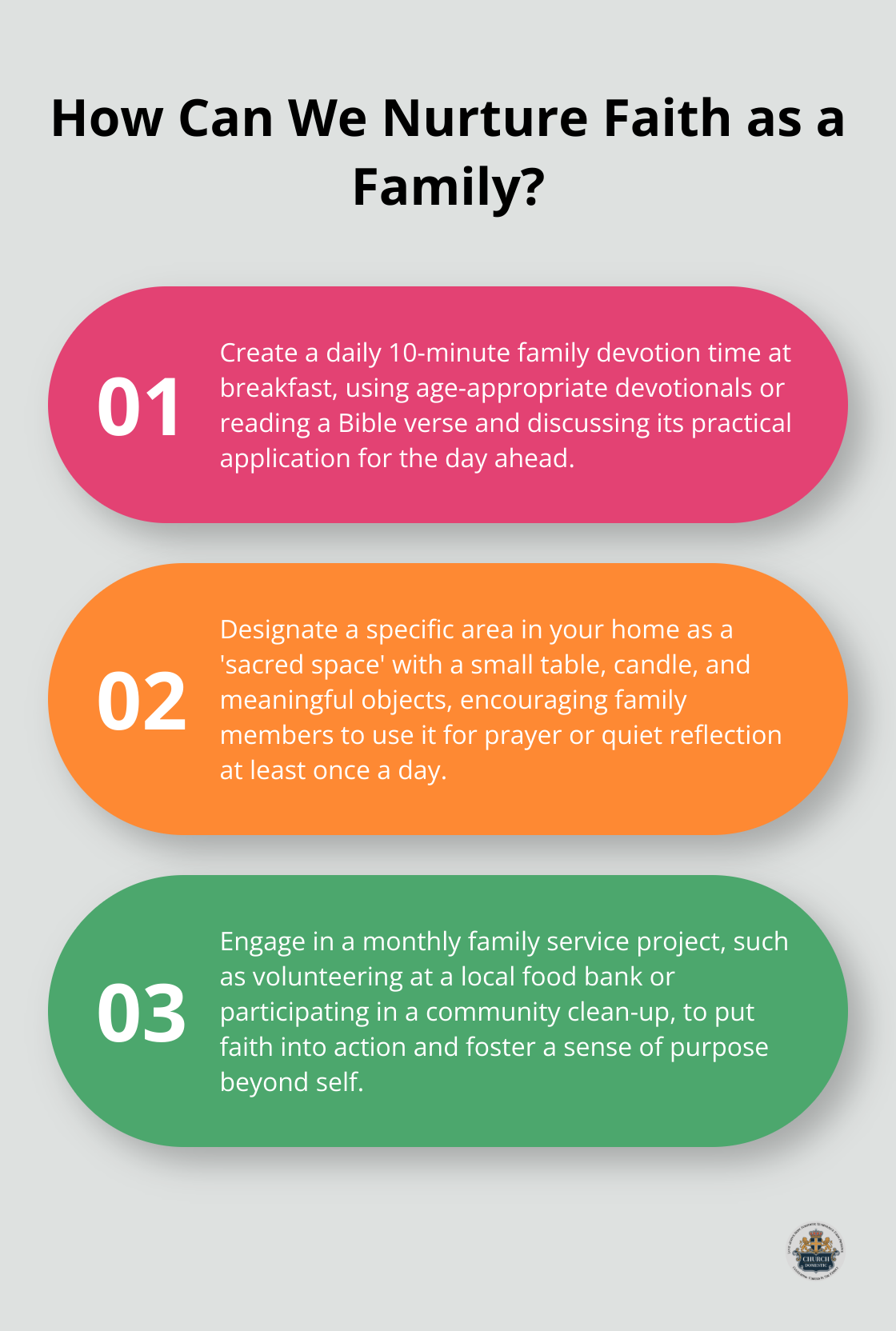Parenting faith is a cornerstone of raising well-rounded, resilient children. At Church Domestic, we understand the challenges parents face in nurturing their child’s spiritual growth in today’s fast-paced world.
This guide offers practical strategies to help you effectively foster your child’s faith, from creating family worship routines to addressing difficult questions. We’ll explore how to overcome common obstacles and provide you with the tools to build a strong spiritual foundation for your family.
Why Faith Matters for Kids
Faith shapes a child’s character and worldview profoundly. It equips kids with tools to navigate life’s challenges and find meaning in their experiences.
Shaping Values and Decision-Making
Faith provides a framework for moral reasoning. Children who understand core spiritual principles make better ethical choices. The concept of treating others as you’d want to be treated, common in many faith traditions, helps kids develop empathy and kindness.

A study found that religious education can be instrumental in improving adolescent mental health, helping them develop healthier reactions to stimuli. This doesn’t mean faith-based kids never err, but they often possess a clearer sense of right and wrong to guide them.
Building Resilience in Tough Times
Life throws curveballs, and faith acts as a powerful coping mechanism. Children with a spiritual foundation often show greater resilience when facing adversity. They tend to view challenges as opportunities for growth rather than insurmountable obstacles.
The American Psychological Association reports that higher levels of religious faith and spirituality were associated with several positive mental health outcomes. For children, this can translate to improved emotional regulation and a more positive outlook during difficult times.
Finding Purpose Beyond Themselves
Faith encourages children to think beyond their immediate wants and needs. It introduces the concept of a higher purpose and the idea that their actions can positively impact the world around them.
A survey by the Pew Research Center revealed that adults who attended religious services as children were more likely to volunteer and engage in community service. Nurturing faith early on potentially sets the stage for a lifetime of meaningful contribution to society.
Practical Application of Faith
To apply these principles, try incorporating faith-based activities into your family routine. This could include:
- Regular family discussions about moral dilemmas (using age-appropriate scenarios)
- Participating in community service projects together
- Exploring stories of inspirational figures who lived out their faith
These activities not only reinforce spiritual concepts but also provide tangible ways for children to experience the positive impact of faith in action.
As we move forward, let’s explore practical strategies for nurturing faith at home, where the rubber meets the road in spiritual development.
How to Make Faith a Daily Family Practice
Create a Sacred Space
Designate an area in your home for spiritual activities. A small table with a candle, Bible, and meaningful objects will suffice. Encourage family members to use this space for prayer, reflection, or quiet time. Research has shown that “Prayer spaces provided distinctive and valued opportunities for pupils to develop their relationship with the sacred and divine.”
Establish Daily Devotions
Select a consistent time each day for family devotions (breakfast, dinner, or bedtime). Keep it brief and engaging, especially for younger children. Use age-appropriate devotionals or read a Bible verse and discuss its meaning. Studies have found positive connections between parents’ religiosity and higher parental warmth.
Integrate Faith into Conversations
Connect daily events with spiritual teachings. When you watch news about a natural disaster, discuss how to help others in need. If your child struggles with a friendship, relate it to biblical stories of forgiveness and kindness. A Barna Group survey found that 68% of churched families rarely or never discuss faith at home, highlighting the need for intentional spiritual conversations.
Leverage Technology Wisely
Use faith-based apps and online resources to supplement your family’s spiritual growth. Many offer daily devotionals, Bible reading plans, or interactive games that teach biblical principles. However, monitor screen time carefully. The American Academy of Pediatrics recommends no more than one hour of screen time per day for children ages 2 to 5, so balance digital resources with offline activities.
Engage in Family Service Projects
Put faith into action by serving others as a family. Volunteer at a local food bank, participate in a community clean-up, or sponsor a child in need. A study published in the Journal for the Scientific Study of Religion found that adolescents who engage in religious volunteering are more likely to volunteer as adults and report higher levels of life satisfaction.
Celebrate Religious Milestones
Make religious holidays and personal faith milestones special occasions for your family. Create traditions around these events that your children will anticipate year after year. Light an Advent wreath during the Christmas season or have a special meal to celebrate baptism anniversaries. These traditions help anchor faith in tangible, memorable experiences.

As you incorporate these practices into your daily routine, you’ll likely face challenges and questions from your children. In the next section, we’ll address how to handle difficult conversations and doubts that may arise during your family’s faith journey.
Navigating Faith Challenges with Your Kids
Tackling Tough Questions Head-On
Kids ask challenging questions about faith. When your child questions why bad things happen to good people or doubts God’s existence, view it as a growth opportunity. Be honest about what you know and don’t know. It’s acceptable to say, “That’s a great question. I’m not sure, but we can explore it together.” Use age-appropriate resources like children’s Bible commentaries or consult your pastor for guidance.

A study found that 4 out of 10 (40%) leave the Church but still call themselves Christian. Create a safe space at home where all questions are welcome.
Balancing Faith in a Digital World
Today’s digital age exposes kids to numerous worldviews. Instead of complete shielding, teach them to engage critically with media. Watch shows or play games together, then discuss how they align (or don’t) with your family’s values. Use parental controls wisely, but also equip your kids to make good choices independently.
Consider using faith-based apps or podcasts as part of your family’s media diet. Developing media literacy can be done by emphasizing questioning sources, playful deconstruction, and creative content creation.
Sparking Interest in Reluctant Kids
If your child seems disinterested in faith, don’t force it. Find creative ways to make spirituality relevant to their interests. For a teen who loves music, explore Christian artists in their favorite genres. For a child interested in science, discuss how faith and science can coexist, using resources from reputable organizations.
Actions speak louder than words. A study by the National Study of Youth and Religion revealed that parents’ own religious devotion is the most important factor in transmitting faith to the next generation.
Addressing Peer Pressure
As kids grow, they may face pressure to conform to non-religious peers. Prepare them by role-playing scenarios they might encounter. Teach them it’s okay to be different and to stand firm in their beliefs.
Encourage friendships with other kids who share your values. Research (from the National Longitudinal Study of Adolescent to Adult Health) shows that religious friends can positively influence a teen’s religious commitment.
These proactive approaches help preserve your child’s faith and develop a robust, thoughtful spirituality that withstands life’s tests.
Final Thoughts
Parenting faith requires dedication, patience, and creativity. You shape your child’s moral compass, build resilience, and foster purpose through consistent spiritual practices. Your efforts to create sacred spaces, establish devotions, and integrate faith into daily life will make spirituality natural for your family.

Challenges present growth opportunities in faith nurturing. Address tough questions, balance modern influences, and tackle disinterest with open discussions. Your persistent modeling of faith will impact your child’s spiritual development more than striving for perfection.
Church Domestic supports you in raising faith-filled children. Our website offers resources to help you navigate faith-based parenting challenges. Lean on your faith community, seek guidance, and celebrate your children’s spiritual growth moments (which may influence future generations).